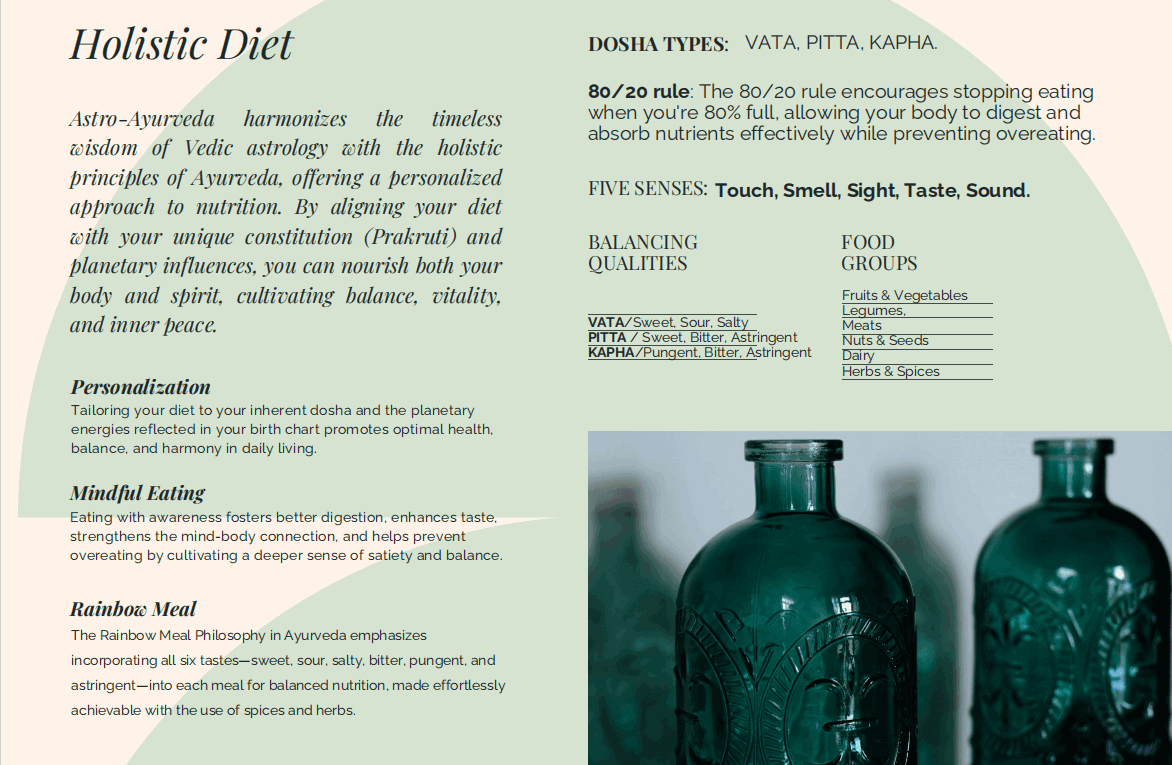Ayurvedic Diet: How It Compares with Popular Diet Trends
-

Ayurveda, with its ‘rainbow meal’ philosophy, offers a holistic approach to balanced nutrition. Often called the ‘science of life,’ Ayurveda highlights the crucial role of gut health in maintaining balance and vitality. Ayurveda s apprach is deeply personalized and balanced.
The focus on gut health and the microbiome is driving a growing shift toward personalized nutrition tailored to individual needs. While diets like keto, paleo, vegan, and non-dairy continue to capture attention, there is a rising trend toward adopting more customized and balanced dietary approaches.
According to McKinsey’s latest Future of Wellness research, which surveyed over 5,000 consumers across China, the UK, and the United States, more than 80% of respondents from these countries consider gut health important. Additionally, over 50% of respondents anticipate prioritizing gut health even more in the next two to three years.
Curious how popular dietary trends align with Ayurvedic principles of balanced nutrition? Explore how Ayurveda compares to five major diets and discover how to assess your own approach for truly holistic, well-rounded nourishment.
-
Ayurvedic vs. Vegan Diet: Energetics Over Ingredients
Veganism aligns with several principles of Ayurvedic nutrition. Its focus on plant-based foods resonates with Ayurveda’s emphasis on a diet rich in prana (life force) and essential nutrients.
Both veganism and Ayurveda advocate for balance and moderation in dietary habits. Additionally, veganism’s commitment to compassion and non-harming reflects Ayurveda’s principles of ahimsa (non-violence) and reverence for all living beings. By abstaining from animal products, vegans embody an understanding of life’s interconnectedness, echoing Ayurveda’s holistic perspective.
While Ayurveda highlights the importance of fresh, plant-based foods for promoting vitality and balance, it is crucial to ensure adequate protein intake. Incorporating a variety of plant-based proteins, such as lentils, chickpeas, quinoa, and tofu, is essential for maintaining overall health.
Ayurveda honors the uniqueness of your dosha, emphasizing personalized nutrition as the key to balance and vitality. Ready to discover your Ayurvedic constituition?
Take a Dosha Quiz and explore how Astro-Ayurveda adds a cosmic layer of insight to tailor your nutrition even more deeply.
-
Ayurvedic Diet vs Keto: Digestive Agni vs Fat-Fueled Metabolism
The Keto diet, with its high-fat, moderate-protein, and low-carbohydrate approach, does not fully align with Ayurvedic principles. While it may benefit individuals with a predominant Kapha constitution, it can disrupt Vata and Pitta doshas.
Nourishing fats like ghee, coconut oil, and avocado can support satiety and the body’s needs. However, from an Ayurvedic perspective, the Keto diet’s restriction of carbohydrates may limit the intake of nutrient-dense foods such as fruits, whole grains, and legumes—key staples in Ayurvedic nutrition known for their vitamins, minerals, and fiber.
The focus on high-fat intake, especially from animal sources, may not align with Ayurvedic recommendations, which favor moderation and plant-based fats.
Integrating Ayurvedic principles into the Keto diet involves incorporating more plant-based fats and ensuring a balanced approach.
-

Ayurvedic Diet vs Paleo: Individual Constitution vs Ancestral Blueprint
The Paleo diet, which focuses on whole foods similar to those consumed by our ancestors, aligns well with the Ayurvedic principles of a holistic diet. Its emphasis on lean proteins, fruits, vegetables, nuts, and seeds mirrors Ayurveda’s focus on natural, unprocessed foods that promote vitality and balance.
The Paleo diet’s promotion of lean proteins, along with fruits, vegetables, nuts, and seeds, complements Ayurveda’s recommendation for a diet rich in fresh, seasonal produce and nutrient-dense sources.
While the Paleo diet excludes grains and dairy, Ayurveda embraces a more inclusive approach, emphasizing the balance of all six tastes to promote digestive harmony. Consulting an Ayurvedic health practitioner can offer personalized guidance on integrating Paleo principles with Ayurveda. By combining the wisdom of both systems, individuals can create a nourishing dietary plan that supports holistic health and vitality.
-
Ayurvedic Diet vs Low-Carb: Balance Over Restriction
Low-carbohydrate diets, such as the Atkins Diet and South Beach Diet, focus on restricting carbohydrate intake while emphasizing protein and healthy fats. These diets aim to regulate blood sugar levels, support weight management, and improve metabolic health by reducing reliance on carbohydrates for energy. As a result, they may appeal to individuals looking to manage their weight, stabilize blood sugar, or boost energy levels.
While low-carb diets target goals like weight management and blood sugar regulation, they often diverge from Ayurvedic nutritional principles. For instance, the Atkins diet, which emphasizes high protein and fat while restricting carbohydrates, may not suit everyone and can conflict with Ayurveda’s focus on balance and individualized nutrition.
Ayurveda encourages harmonizing tastes, qualities, and food groups to support holistic well-being. Although low-carb diets may benefit some, it’s crucial to tailor dietary choices to one’s unique constitution and Ayurvedic principles for optimal health.
-

Ayurvedic Diet vs Mediterranean: Aligned in Wholeness, Differing in Personalization
The Mediterranean diet, inspired by the traditional culinary practices of regions along the Mediterranean Sea, emphasizes wholesome nutrition through a variety of whole, minimally processed foods. It includes an abundance of fruits, vegetables, whole grains, legumes, nuts, seeds, and the prized olive oil. The diet also supports moderate consumption of fish, poultry, dairy, and occasional red wine.
The Mediterranean diet is celebrated for its ability to reduce chronic disease risk, promote heart health, and support longevity, closely aligning with Ayurvedic principles. Both emphasize balance, moderation, and the consumption of nutrient-rich, whole foods.
Ayurveda’s focus on nourishing the body and supporting its innate healing abilities resonates with the Mediterranean diet’s holistic approach, making it a complementary choice for maintaining optimal health and vitality.
-
The Ayurvedic Perspective on Holistic Diet
At the heart of Ayurveda lies a profound understanding of the three Doshas—Vata, Pitta, and Kapha—and the importance of maintaining their balance. Each Dosha significantly influences both physiological functions and mental energies. Identifying your dominant Dosha and its nuances provides valuable insights for maintaining mind-body balance and making tailored dietary choices for optimal health and vitality.
Ayurvedic nutrition fosters a personalized, balanced, and mindful approach to eating, promoting overall well-being and vitality through the use of all six tastes.
- Sweet: Nourishes Vata, soothes Pitta, and calms Kapha.
- Sour: Stimulates digestion and balances Vata and Kapha but may aggravate Pitta if overconsumed.
- Salty: Enhances flavor, aids digestion, and pacifies Vata and Kapha.
- Bitter: Detoxifies and cools Pitta and Kapha, though excessive intake may aggravate Vata.
- Pungent: Promotes digestion and circulation, balances Kapha, but can aggravate Pitta and Vata when overused.
- Astringent: Supports tissue repair and balances Pitta and Kapha but can increase Vata if consumed in excess.
While intermittent fasting has gained popularity for its health benefits and flexibility, it may not align with Ayurvedic principles, which emphasize balance. Intermittent fasting is better suited for Kapha types, who naturally tolerate irregular eating patterns, while Vata types may struggle, as they thrive on frequent, smaller meals for stability.
Ayurveda discourages extreme regimens and instead advocates for occasional fasting or reduced food intake to support cleansing and relaxation. Maintaining a regular meal schedule, taking a brief walk after meals, and practicing mindful eating are key to aligning with Ayurvedic holistic nutrition principles.
-

Download Our Holistic Diet Booklet
For a deeper dive into Ayurvedic principles and practical dietary guidance, download our free Holistic Diet Booklet. This resource offers a comprehensive approach to balanced nutrition, personalized to your body’s unique needs. Embrace a holistic, well-rounded nutrition plan to enhance your vitality and well-being.



